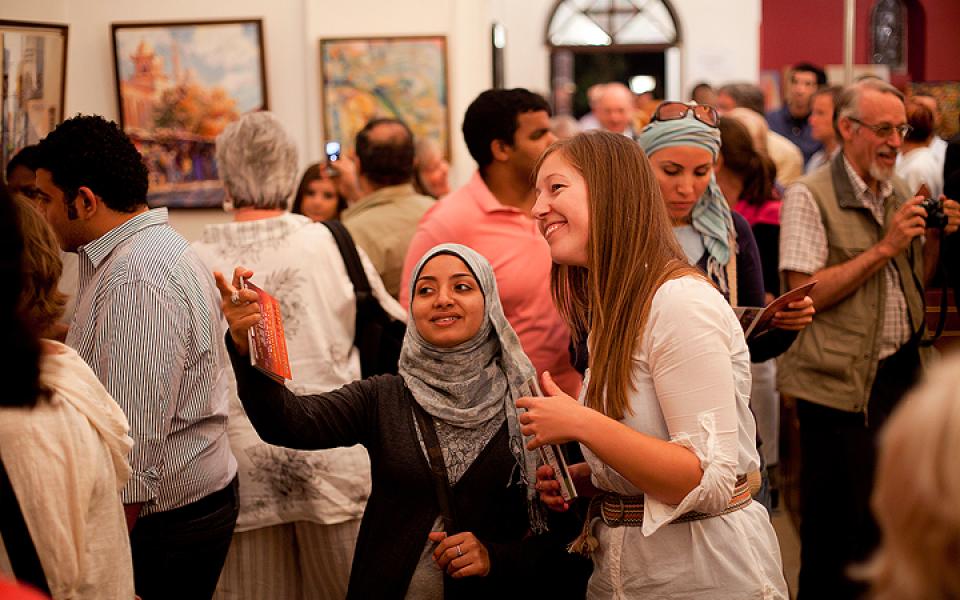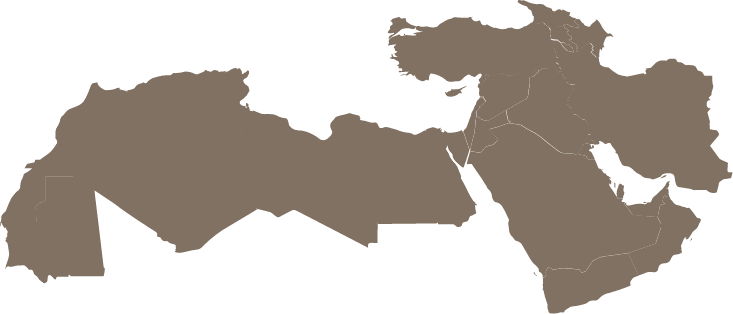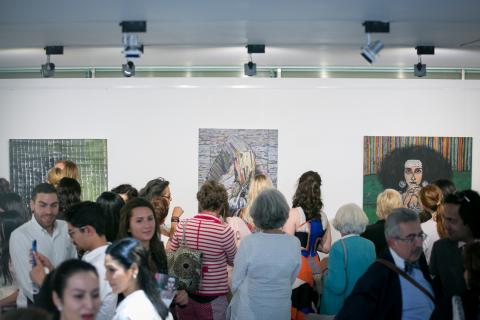
Above: A pair of Muslim and Christian women enjoy the art at a CARAVAN festival
From its not-so-humble beginnings in Cairo, Egypt, CARAVAN has been mobilizing interfaith initiatives through the power of art for six years. Its mission: To build bridges through the arts between creeds and cultures of the East and West.
As one of URI’s newest Cooperation Circles, the group began to emerge in 2009 as “The CARAVAN Festival of the Arts,” focusing on visual art, film, literature and music by artists of diverse faith and cultural backgrounds. Held at the historic St. John’s Church in Cairo, the event immediately gained global media attention.
“Both the attention we received, and the results, surprised us all,” said Rev. Canon Paul-Gordon Chandler, Founder and President. “I was living in Cairo at the time, working as the Rector of the International Episcopal Church there, and we discovered how much the arts can be used to build respect, increase understanding, and encourage friendship between those of different faiths and cultures between MENA and the West. Our focus is on the monotheistic faiths that originated in the Middle East.”
Today, CARAVAN still holds a major presence in Egypt, but its members also operate out of the US and the MENA region.
CARAVAN’s festivals and arts programs naturally offer a space for artists and attendees to develop meaningful connections. They also provide a context from which numerous other interfaith initiatives, informal and formal, naturally develop. One example is the “Imam/Priest Exchange,” a program that was sparked through CARAVAN’s 2011 Festival of the Arts.
The Episcopal Diocese of Egypt currently coordinates the Imam/Priest Exchange, with Al Azhar (the spiritual and intellectual heart of Sunni Islam) serving as a partner. The program not only facilitates friendships for Christians and Muslims, but it allows religious leaders to become ambassadors for peace in their local communities.
In 2013, CARAVAN held its annual arts festival at both St. John’s Church in Cairo and St. Paul’s Cathedral in London. The event sparked international attention with its public art exhibitions and life-sized collection of decorated donkeys (donkeys symbolizing peace and compassion in Islam and Christianity). Over 120,000 people were estimated to have viewed the London-based exhibition. Plans this year for the CARAVAN Exhibition of Visual Art include Cairo, Washington D.C. and New York City.
As of April 2014, CARAVAN now operates as an international and interfaith humanitarian arts non-profit. In recent years, its members have been invited to develop interfaith arts initiatives in places like Bangor, Wales; Birmingham, England; Malta; the West Bank and Israel; Tunisia; Jordan; and New Delhi, India.
As a new Cooperation Circle, CARAVAN will now have the opportunity to assist other CCs directly. “We look forward to the possibility of being a resource to other CCs and their initiatives, and being a catalyst for similar work around the world,” Paul-Gordon said.
Through all of the groundbreaking work that they have already accomplished, CARAVAN seems like a natural fit for the URI community. “What impresses me about URI is that it is not formed just from religious leaders, it is more grassroots, and I think this is what gives URI its unique and strategic,” Paul-Gordon said. “Our members love the Charter and we all feel we have been living it since our inception.”

